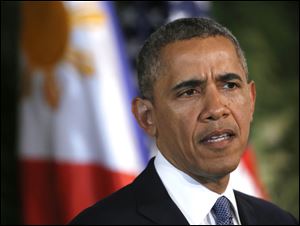
GUEST EDITORIAL
America’s global role
5/10/2014
Obama
For seven decades since the end of World War II, the United States has shouldered the responsibility of global security guarantor. As the toll, physical and financial, of the most recent U.S. military engagements undeniably reminds us, that role imposes a price on this country and its people — in and out of uniform.
It is natural that many Americans would wish to lay down that burden: A new Wall Street Journal/NBC News poll found that 47 percent of Americans want the United States to be “less active” in world affairs — a 33 percentage-point increase since 2001, the year when al-Qaeda terrorists attacked. And with crucial elections scheduled for this November and November, 2016, it is equally natural that politicians would compete for votes by promising to give a world-weary electorate what it says it wants.
Understandable as this latest iteration of the United States’ perennial isolationist temptation might be, it must be resisted. The benefits of maintaining world order, to Americans and to the world, are far greater.
They include the huge financial advantages the United States reaps because of the preeminence of the dollar, a vast expansion in poverty-reducing world trade and — despite many contradictions in, and lapses of, U.S. policy — a net gain in individual freedom and national self-determination.
The horrible devastation of World War II might have been avoided or at least mitigated if the United States had assumed a greater global role prior to 1941. Conversely, the world as we know it today is a product of the long-term security investments of the post-1945 era.
South Korea, once a war-torn, impoverished dictatorship, is now a democracy and one of the world’s largest and most dynamic economies. Millions of Americans carry Samsung smart phones. None of this would have happened without the — admittedly expensive, undoubtedly risky — long-term U.S. military presence on the Korean peninsula.
Noninvolvement, or even dramatically reduced involvement, in world affairs is not an option for a continental nation that is simultaneously the world’s largest democracy, its greatest military power, and a vast marketplace. Actually, Americans probably grasp this reality better than headline data imply.
The Wall Street Journal/NBC News poll showed that 43 percent of the public considers economic globalization good for the United States, up 18 points since the recession began in 2008. And 55 percent want the President to show “willingness to confront our enemies and stand up for our principles,” rather than “negotiat[ing] with friends and foes alike.”
If the President focuses on the costs of the U.S. global role, so will ordinary Americans. To be sure, an openly isolationist Republican, Sen. Rand Paul of Kentucky, seems intent on exploiting that tendency all the way to the White House in 2016.
Of more concern now is Mr. Obama’s inconsistent defense of U.S. leadership. Too frequently, that takes the form of accusing critics of favoring war over diplomacy or, as the President said last week, of advertising this country’s weariness of “a decade of war at enormous costs to our troops and to our budget.”
Americans will indeed pay a heavy price, and bear heavy burdens, to secure the survival and success of liberty — and their own self-interest. They won’t rally to the sound of an uncertain trumpet.